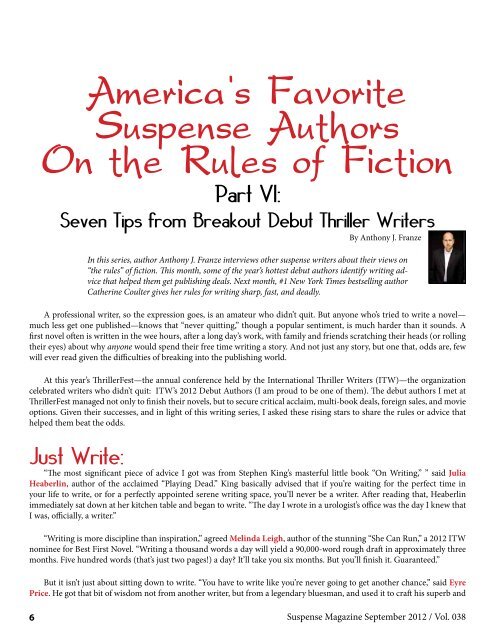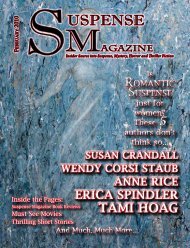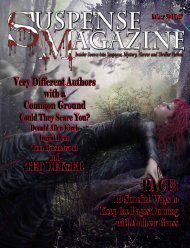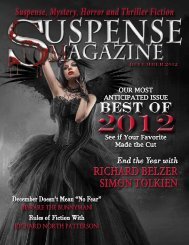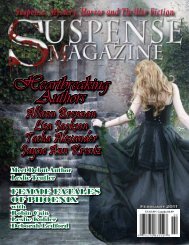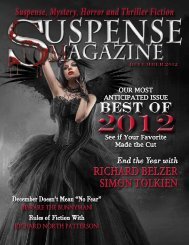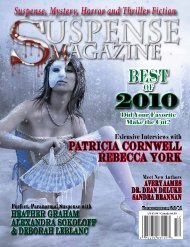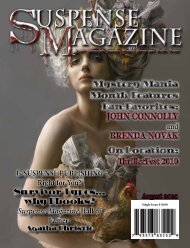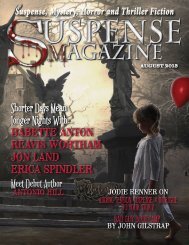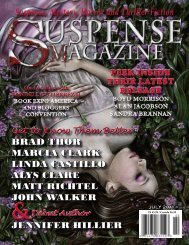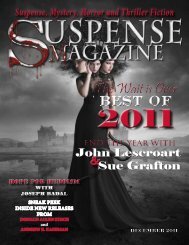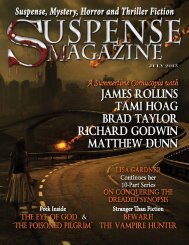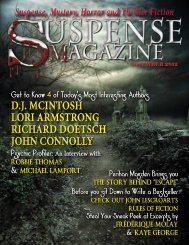Suspense, Mystery, Horror and Thriller Fiction - Suspense Magazine
Suspense, Mystery, Horror and Thriller Fiction - Suspense Magazine
Suspense, Mystery, Horror and Thriller Fiction - Suspense Magazine
You also want an ePaper? Increase the reach of your titles
YUMPU automatically turns print PDFs into web optimized ePapers that Google loves.
America's Favorite<br />
<strong>Suspense</strong> Authors<br />
On the Rules of <strong>Fiction</strong><br />
Part VI:<br />
Seven Tips from Breakout Debut <strong>Thriller</strong> Writers<br />
By Anthony J. Franze<br />
In this series, author Anthony J. Franze interviews other suspense writers about their views on<br />
“the rules” of fiction. This month, some of the year’s hottest debut authors identify writing advice<br />
that helped them get publishing deals. Next month, #1 New York Times bestselling author<br />
Catherine Coulter gives her rules for writing sharp, fast, <strong>and</strong> deadly.<br />
A professional writer, so the expression goes, is an amateur who didn’t quit. But anyone who’s tried to write a novel—<br />
much less get one published—knows that “never quitting,” though a popular sentiment, is much harder than it sounds. A<br />
first novel often is written in the wee hours, after a long day’s work, with family <strong>and</strong> friends scratching their heads (or rolling<br />
their eyes) about why anyone would spend their free time writing a story. And not just any story, but one that, odds are, few<br />
will ever read given the difficulties of breaking into the publishing world.<br />
At this year’s <strong>Thriller</strong>Fest—the annual conference held by the International <strong>Thriller</strong> Writers (ITW)—the organization<br />
celebrated writers who didn’t quit: ITW’s 2012 Debut Authors (I am proud to be one of them). The debut authors I met at<br />
<strong>Thriller</strong>Fest managed not only to finish their novels, but to secure critical acclaim, multi-book deals, foreign sales, <strong>and</strong> movie<br />
options. Given their successes, <strong>and</strong> in light of this writing series, I asked these rising stars to share the rules or advice that<br />
helped them beat the odds.<br />
Just Write:<br />
“The most significant piece of advice I got was from Stephen King’s masterful little book “On Writing,” ” said Julia<br />
Heaberlin, author of the acclaimed “Playing Dead.” King basically advised that if you’re waiting for the perfect time in<br />
your life to write, or for a perfectly appointed serene writing space, you’ll never be a writer. After reading that, Heaberlin<br />
immediately sat down at her kitchen table <strong>and</strong> began to write. “The day I wrote in a urologist’s office was the day I knew that<br />
I was, officially, a writer.”<br />
“Writing is more discipline than inspiration,” agreed Melinda Leigh, author of the stunning “She Can Run,” a 2012 ITW<br />
nominee for Best First Novel. “Writing a thous<strong>and</strong> words a day will yield a 90,000-word rough draft in approximately three<br />
months. Five hundred words (that’s just two pages!) a day? It’ll take you six months. But you’ll finish it. Guaranteed.”<br />
But it isn’t just about sitting down to write. “You have to write like you’re never going to get another chance,” said Eyre<br />
price. He got that bit of wisdom not from another writer, but from a legendary bluesman, <strong>and</strong> used it to craft his superb <strong>and</strong><br />
6 <strong>Suspense</strong> <strong>Magazine</strong> September 2012 / Vol. 038


